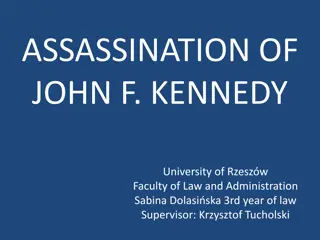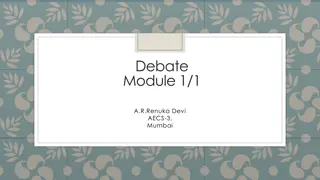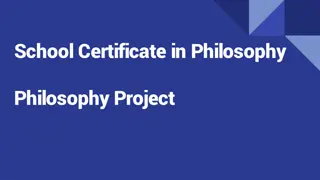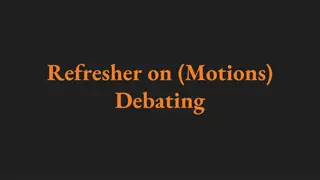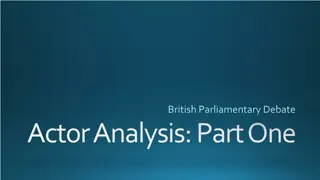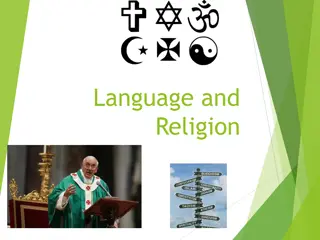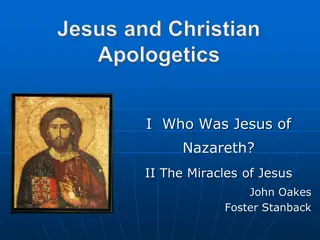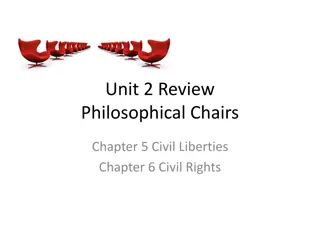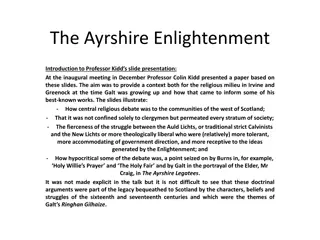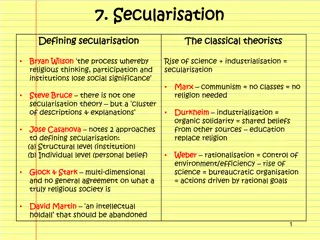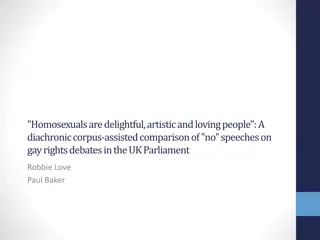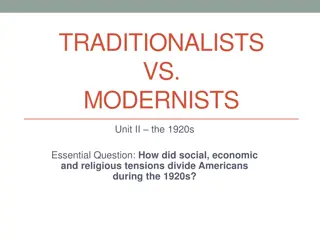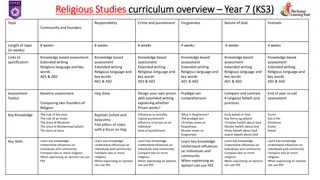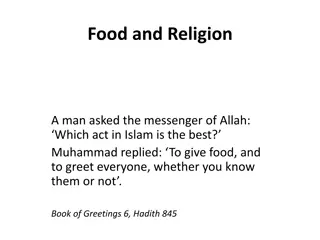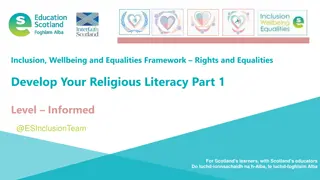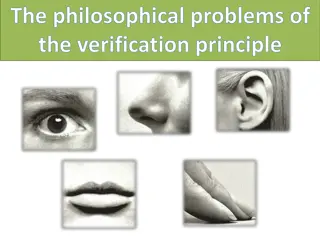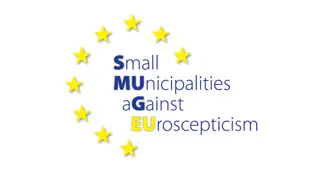Status of Family Laws in India: Hindu vs. Religious Minorities
The family and personal status laws in India vary between Hindu law and those pertaining to religious minorities. While Hindu law has seen extensive reforms, discriminatory provisions still exist. In contrast, laws governing religious minorities have undergone fewer reforms, leading to greater inequ
2 views • 4 slides
John F. Kennedy: A Life Marked by Tragedy and Legacy
John F. Kennedy, the 35th President of the United States, led a remarkable life filled with achievements and challenges. From his early education at prestigious institutions to his service in the U.S. Navy Reserve, Kennedy's journey was one of dedication and courage. His presidency, marked by histor
4 views • 11 slides
Understanding Religious Conflict: Definition and Types Explored
Religious conflict is a complex and recurring concept throughout history. Scholars have defined it as disagreements between religious groups. This conflict arises from contentious issues touching on ideology, morality, power, and identity, influenced by various socio-political, economic, and cultura
1 views • 13 slides
Evolution of Akbar's Religious Policy: A Historical Overview
In the 16th century, Akbar the Great implemented a revolutionary religious policy in the Mughal Empire. Initially a devout Sunni Muslim, Akbar evolved his stance to promote harmony and equality among all religions, fostering tolerance and understanding. This shift marked a significant departure from
1 views • 25 slides
Comprehensive Guide to Debates in Educational Settings
Understanding the key elements of debates including design, preparation, conducting, and post-debate discussions. Explore the structure, roles, and rules involved in debates to enhance critical thinking and communication skills among students.
0 views • 23 slides
Exploring the Future of Medicine: Genetics, Innovations, and Debates
Delve into a captivating journey through the realms of genetics, medical innovations, and thought-provoking debates surrounding designer babies. Discover the evolution of healthcare, from insulin pumps to genetic design, and ponder the ethical implications of shaping offspring through genetic engine
0 views • 13 slides
Elizabethan Religious Settlement: Unity Amidst Division
Amid religious division in England, Queen Elizabeth I implemented a Religious Settlement in 1559 to unify the country. The settlement, a blend of Protestant and Catholic elements, aimed to maintain peace and prevent rebellions. Elizabeth's strategic compromise pleased most people, though lingering t
0 views • 14 slides
Understanding Secularism: Principles and Advantages
Secularism is the principle of separating government institutions from religious entities to ensure equal rights for believers and non-believers. It safeguards freedom of religious belief and practice, upholds religious freedom, and promotes democracy and fairness. Secularism aims to prevent religio
0 views • 21 slides
Year 5 English - Spelling Practice and Debating Skills
Engage in spelling practice by choosing and mastering 10 words, explore the art of debating in a structured way, understand the language and techniques used in debates, and learn how judges score debates based on delivery, content, teamwork, and response to opposing arguments.
0 views • 25 slides
Understanding Religious Language: Cognitivism vs. Non-Cognitivism in the University Debate
This discussion explores the debate between cognitivism and non-cognitivism in religious language. Cognitivism asserts that religious claims aim to describe the world and can be true or false, while non-cognitivism argues that such claims express attitudes and cannot be verified. Flew's challenge qu
0 views • 9 slides
Philosophy Project: Exploring Ideas, Debates, and Research
Dive into the world of philosophy by embarking on a project that involves exploring philosophical ideas, engaging in debates, conducting research, presenting arguments, and drawing conclusions. Develop critical thinking skills and delve into thought-provoking questions. Choose a topic, conduct thoro
0 views • 8 slides
Understanding Economic and Social Justice Debates
Explore the nuances of economic and social justice debates, delving into topics such as burden of proof, individual and corporate economic perspectives, aggregate effects, and approaches to social justice rounds. Uncover key arguments, examples, and considerations for engaging in these critical disc
0 views • 13 slides
Understanding Actor Analysis in British Parliamentary Debates
This detailed analysis explores the concept of Actor Analysis in British Parliamentary debates, covering aspects such as preparation, in-round analysis, and weighing actor impacts. It emphasizes the importance of considering various factors including socio-economic status, minority groups, and histo
0 views • 10 slides
Guide to Using the BSA Calendar of Religious Observances
The BSA Calendar of Religious Observances is a valuable resource for scheduling scouting events in consideration of various religious holidays and observances. This guide provides an overview of the calendar, highlights important dates, and emphasizes the importance of respecting religious diversity
0 views • 8 slides
Understanding the Role of Language in Religion
Exploring the significance of language in religious contexts, this content discusses the functions, features, lexicon, grammar, and metaphorical aspects present in religious language. It delves into how religious language upholds spiritual beliefs, persuades believers, and expresses specific attitud
0 views • 8 slides
Exploring the Identity of Jesus: Claims, Miracles, and Debates
Dive into the multifaceted identity of Jesus of Nazareth through an examination of his claims, miraculous deeds, and the ongoing debates surrounding his historical significance, including comparisons with other religious leaders.
0 views • 62 slides
Understanding the Cultural Dimensions of Food and Religious Influences in Culinary Arts
Explore the impact of religious beliefs on food traditions and dietary restrictions across different cultures in the culinary world. Learn about the influence of major world religions on eating habits, food choices, and culinary practices. Discover how various religious groups, such as Christians, o
0 views • 26 slides
Exploring Key Constitutional Debates: Civil Liberties, Civil Rights, and More
Explore vital topics such as the 1st Amendment, search and seizure laws, due process, gender equality, reproductive rights, affirmative action, and beyond. Engage in debates surrounding these critical issues and delve into landmark legal cases that have shaped American society.
0 views • 9 slides
The Vital Role of Religious Institutions in Supporting Immigrants
Religions and immigration are interlinked in modern societies, where religions play a significant role in providing services, defending rights, and supporting the social cohesion of immigrants. Mainstream religious institutions serve as key actors in offering assistance, advocating for migrant right
2 views • 14 slides
Understanding Religious Language: Flew, Hare, Mitchell
Exploring the contrasting views of cognitivism and non-cognitivism in the context of religious language through the perspectives of Flew, Hare, and Mitchell. Delve into Flew's challenge on the undetectable gardener, Hare's concept of bliks, and Mitchell's response to the rationality of religious bel
0 views • 7 slides
The Ayrshire Enlightenment: Religious Debates and Cultural Struggles in 18th-Century Scotland
Professor Colin Kidd's slide presentation delves into the religious milieu of Irvine and Greenock during James Galt's upbringing, highlighting the pivotal role of religious debates in shaping society. The contention between traditional Calvinists (Auld Lichts) and more liberal thinkers (New Lichts)
0 views • 12 slides
Religious Accommodation in the Army: Advising Command
The content discusses the role of the Chaplain Corps in advising Soldiers and leaders on religious accommodation in the Army as of February 13, 2019. It covers learning objectives, legal foundations, Army policies, procedures, recent changes, and references related to religious accommodation. The in
0 views • 36 slides
Analyzing Arguments in English Debates: A Critical Approach
Explore and critique various arguments presented in English debates, including topics like dietary recommendations, digestion issues with Japanese rice, and driving skills in different weather conditions. Learn how to evaluate evidence, causality, and persuasiveness in arguments to develop critical
0 views • 19 slides
Understanding Religious Discrimination Laws in California Workplace
Learn about the regulations and protections under FEHA and Title VII in California, including religious exemptions, accommodation requirements, case studies, and best practices to address discrimination issues effectively. Discover the statistical insights on religious discrimination complaints and
0 views • 45 slides
Understanding Secularisation: The Decline of Religious Influence in Society
Secularisation refers to the process in which religious thinking, participation, and institutions lose their social significance. This phenomenon is influenced by factors such as the rise of science, industrialisation, changing social attitudes, and the disengagement of the church from society. Evid
0 views • 8 slides
Philosophers' Views on Religious Experience: Insights and Critiques
This lesson delves into the perspectives of various philosophers such as Rudolph Otto, Richard Swinburne, John Hick, and Michael Persinger on religious experiences. It explores concepts like the numinous, religious knowledge, God's existence, and criticisms on the validity of religious experiences.
0 views • 7 slides
Philosophers' Views on Religious Experience: Insights from William James
Explore William James' perspective on religious experiences, including his views on existential and value judgments. Understand how James argued for the validity of religious experiences and their potential proof of God's existence. Delve into the implications of emotions and prior beliefs on interp
0 views • 7 slides
Insights into the 2020 U.S. Presidential Debates
The content provides detailed information on the 2020 U.S. Presidential Debates, including engagement strategies, Georgia Standards of Excellence, learning targets, key vocabulary terms, debate facts, and thought-provoking questions for viewers. It covers historical context, candidate responses, deb
0 views • 27 slides
Religious and Social Conflicts Fueling the Rise of Absolutism in Europe
Social, economic, and religious conflicts in Europe played a significant role in the emergence of absolutism where monarchs wielded supreme power without sharing it with legislative bodies. Events like Spain's religious conflicts, Protestantism in England, the Spanish Armada, religious conflict in t
0 views • 10 slides
Diachronic Corpus-Assisted Comparison of "No" Speeches on Gay Rights Debates in UK Parliament
This study examines language changes in debates on gay rights in the UK Parliament from 1998-2000 to 2013, focusing on anti-equality arguments and representations of gay people. It analyzes corpus data from opposition speeches against the Sexual Offences (Amendment) Bill and Marriage (Same-Sex Coupl
0 views • 38 slides
Social Divisions in 1920s America: Traditionalists vs. Modernists
In the 1920s, American society was divided along social, economic, and religious lines, leading to tensions between traditionalists and modernists. Traditionalists upheld long-held cultural and religious values as anchors of stability, while modernists embraced new ideas and trends, viewing traditio
0 views • 14 slides
Religious Pluralism and Civil Society: A Paradox in Government Control
Understanding the intricacies of religious pluralism in the context of government control reveals a paradox where restricting religion can hinder social cohesion and economic growth. Through insights on the counterproductivity of control, the role of religious organizations in civil society, and the
0 views • 16 slides
Morality in UK Drug Policy: Policy Constellations Analysis
Morality plays a significant role in shaping drug policy in the UK, as revealed by the research conducted by Professor Alex Stevens at the University of Kent. The study investigates the moral commitments underlying different policy positions in UK drug policy debates, highlighting five ethico-politi
0 views • 19 slides
US Religious Freedom Restoration Act (RFRA) Overview
The US Religious Freedom Restoration Act (RFRA) aims to protect the free exercise of religion by ensuring that governments do not substantially burden religious practices without compelling justification. It emphasizes striking a balance between religious liberty and governmental interests through t
0 views • 9 slides
Religious Studies Curriculum Overview for Year 7 and 8 (KS3)
Explore various topics such as responsibility, crime and punishment, forgiveness, nature of God, festivals, community, founders, worship, creation, life after death, rules and laws, relationships in this detailed Year 7 and 8 (KS3) Religious Studies curriculum. The curriculum includes assessments, e
0 views • 6 slides
Exploring the Intersection of Food and Religion Throughout History
Explore the multifaceted relationship between food and religion, from the teachings of Prophet Muhammad emphasizing generosity to the impact of religious beliefs on food choices and regulations. Delve into historical events such as religious hate crimes related to food, debates on beef consumption i
0 views • 17 slides
Developing Religious Literacy for Educators in Scotland
This resource aims to enhance educators' understanding of religious literacy by exploring religious discrimination, core beliefs of major faiths, and additional learning sources. It encourages educators to consider the needs of learners in relation to their religious beliefs in Scotland.
0 views • 30 slides
Understanding the Philosophical Problems of Religious Language
Explore the challenges and debates surrounding religious language, specifically focusing on the verification principle, cognitive vs. non-cognitive aspects, and the meaningfulness of statements about God. Delve into the perspectives of religious believers and Logical Positivists, along with the infl
0 views • 18 slides
Exploring Euroscepticism Through Public Debates in Rural Areas
Local citizens in rural areas will engage in public debates to share their perspectives on the EU, discussing the positives and negatives of EU membership, project successes, challenges, and interactions with civil society. The debates will focus on euroscepticism, fostering active citizenship and e
0 views • 38 slides
Settling the Northern Colonies: Religious Transformation and Colonization
The Protestant Reformation led to the emergence of Puritanism in the Northern Colonies, with figures like Martin Luther and John Calvin shaping religious beliefs. The Massachusetts Bay Colony stood as a beacon of self-government and religious ideals, while dissenters like Anne Hutchinson and Roger W
0 views • 9 slides

